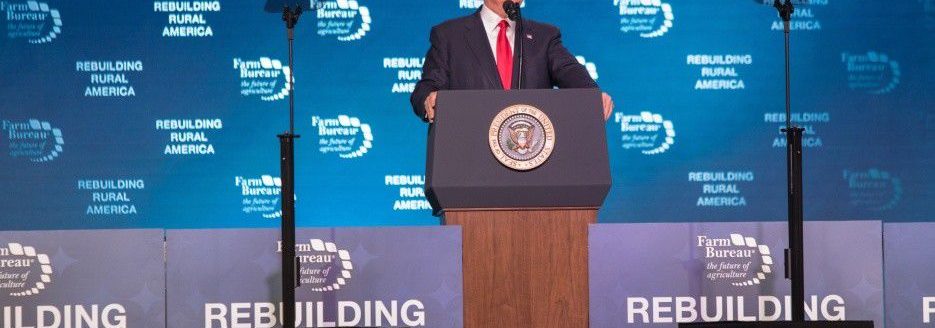President Donald Trump’s trade war must end, and if it doesn’t happen soon, Congress should stop him. Farmers also should realize that payments in reaction to the tariffs are grossly insufficient.
So said Barry Flinchbaugh, Ph.D., emeritus professor of agricultural economics and Extension state leader in the subject at Kansas State University. Flinchbaugh spoke at a Farm Foundation forum on the 2018 farm bill in Washington Feb. 12.
“The attitude is changing. (Farmers) are still pretty quiet about it in terms of getting up at a meeting,” but “they are embarrassed that they fell for (Trump) to a degree,” Flinchbaugh said.
“When you go to see the banker to get financing for the following year, reality sets in,” Flinchbaugh said. “The bankers are not as ideologically tied to this administration as the farmers were at the beginning.
“Farmers are visiting with their bankers, and I notice the change,” Flinchbaugh said. “They are getting pretty vocal on this damn trade war. They are no longer accepting it out of loyalty—you don’t hear ‘we will take the short-run pain for the long run gain.’ They’ve discovered there is no long-run gain. I would suggest the White House spend some time on the wagon tongues. They’re going to get a rude awakening in farm country. We’ve about had it.”
Flinchbaugh told the forum about the multitude of trade wars conceived by the administration, “It is time to admit it was ill conceived and was never going to work and simply end it.”
The new farm bill, which was the topic of the forum, “can make up” for some of the uncertainty caused by the trade situation, “but none of this is sufficient,” Flinchbaugh said.
Tariffs hurt farmers, manufacturers
“I couldn’t be more blunt. We need to end this trade war now. Putting tariffs on aluminum and steel was stupid, period. It has had all kinds of ramifications. Countries retaliate—surprise, surprise. We can’t act like they’re not going to do that. They’re not stupid.”
The steel and aluminum tariffs, he said, have not only resulted in retaliatory tariffs on farm products that have hurt sales, but also caused increases in the costs of production, especially on farm machinery.
The trade conflict with Canada on national security grounds is “ludicrous,” he said.
The United States, Flinchbaugh said, should then build multilateral trade agreements and negotiate with the countries that are participating in the Trans Pacific Partnership agreement to rejoin it.
“It made no sense to pull out of TPP,” Flinchbaugh said.
“U.S. farm net income has been cut in half in the past five years. That is an astounding statistic. We’ve got problems in farm country. We are in the midst of a vicious trade war that will cost agriculture billions.
“History shows that no one wins the trade war. Everybody loses. Sales that have not been made are lost. It is simply like losing sleep. You can’t make it up. Agriculture is an innocent bystander.”
MAP payments help
Flinchbaugh called Market Facilitation Program payments the Trump administration has made through the Commodity Credit Corporation are “an attempt to correct part of that … Certainly farmers appreciate them and need them, but they are grossly inefficient, so agriculture needs this farm bill more than it has needed any farm bill since the mid-1980s.”
“OMB just estimated that for FY 2019, payments will exceed $17 billion, up from $9 billion in the previous year. Obviously, the impact of this safety net is significant.”
Sign up for HPJ Insights
Our weekly newsletter delivers the latest news straight to your inbox including breaking news, our exclusive columns and much more.
Although Secretary of Agriculture Sonny Perdue has said that the Trump administration will not make another round of MFP payments, Flinchbaugh said Trump might change his mind.
“Are farmers going to take the brunt of this period when they are innocent bystanders?” Flinchbaugh asked. “I don’t think so. We have enough influence in the Congress that we can remedy this to a degree. I don’t think they are going to throw us to the wolves.”
Flinchbaugh did not mention a specific piece of legislation that would restrict Trump’s powers to impose tariffs, but he said, “Congress can end that tomorrow. They are not helpless. They just need some fortitude to do some of these things. If you are going to handle authority as irresponsibly as it has been handled in the trade war you take away that authority or tighten it.”
Farm bill a victory
When the history book is written, Flichbaugh said, the real contribution of this farm bill is that is this is a farmer-friendly farm bill.
“No longer will farmers have to make a Vegas-like five-year decision. They have a two-year decision and then an annual decision,” Flinchbaugh said. “That’s a huge improvement.
“When it comes to conservation, some are arguing this is a mixed bag, especially since the then chairman of the House Agriculture Committee attempted to kill the (Conservation Security Program). They succeeded in cutting funding for it in half, but we’re still talking about a billion dollars, that will make an economic and conservation contribution, based on how the CSP legislation finally was passed, rather than following the political implications of the House version of the farm bill, which attempted to kill CSP. That grassland established under the 1996 farm bill will continue to be enrolled in the CSP and paid a fixed payment.”
This farm bill, Flinchbaugh said, was developed “using the tried and true, old-fashioned, political process. Some call it regular order. It’s almost unheard of in today’s congressional operation. The committees put farmers first, politics second. It’s hard to find as strong a bipartisan approach to a farm bill as you’d find with Chairman Roberts and Ranking Member Stabenow. That’s the way it’s supposed to be. The way it’s supposed to work.
“What do farmers need more than anything else? It is certainty. It sure isn’t coming from this trade war. It’s not coming from a government shutdown. It’s coming from this farm bill. We need to stop and think about what Roberts and Stabenow really accomplished, especially in this dysfunctional atmosphere in Congress and the executive branch.
“They passed a farm bill. They did it on time. It’s comprehensive. As the chairman would say when he got into a political argument, he says ‘I need 60 votes.’ Without 60 votes there’d be no farm bill and it astounded me that there were those who could not count. Not only did he not get 60 votes, he got 87. That’s unheard of. They even overcame the dispute over the SNAP work requirements, which could have stopped the process for weeks or months. They put farmers, food and agriculture above that petty political process and established a solid safety net.”
There’s a chance, even in this current political environment, the country will continue the theme that this farm bill built on the previous farm bill, Flinchbaugh said.
“The evolutionary process has built a foundation on which to build future farm policy. A contract, if you will, between farmers and their government. A management program that provides certainty and stability, a safety net under which farm income can improve and a framework can be developed,” Flinchbaugh said.
“The glue that holds it together is the SNAP and other nutrition programs. Out here in farm country, we tend to forget that these programs affect every congressional district. There are no exceptions.”
Larry Dreiling can be reached at 785-628-1117 or [email protected].



